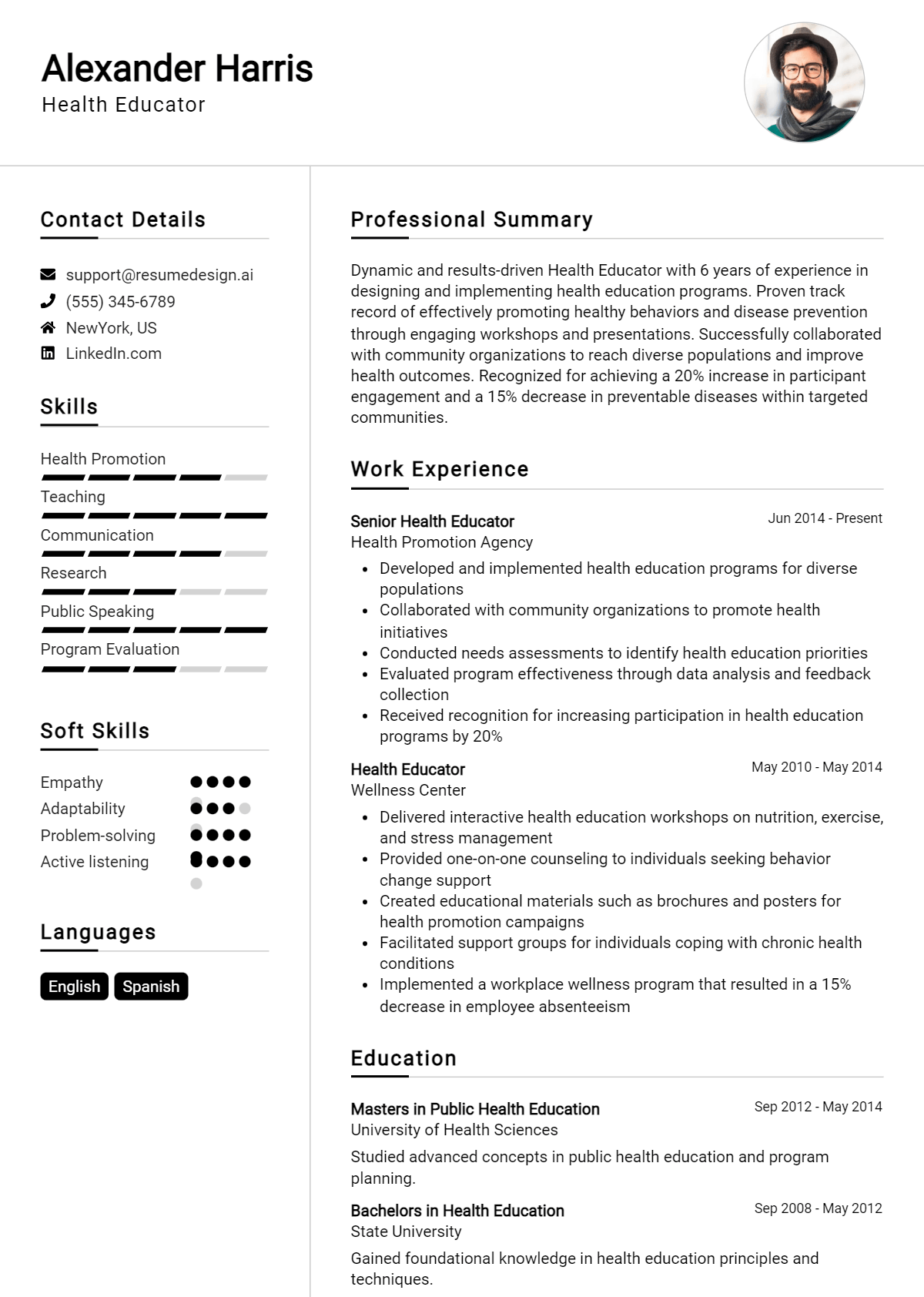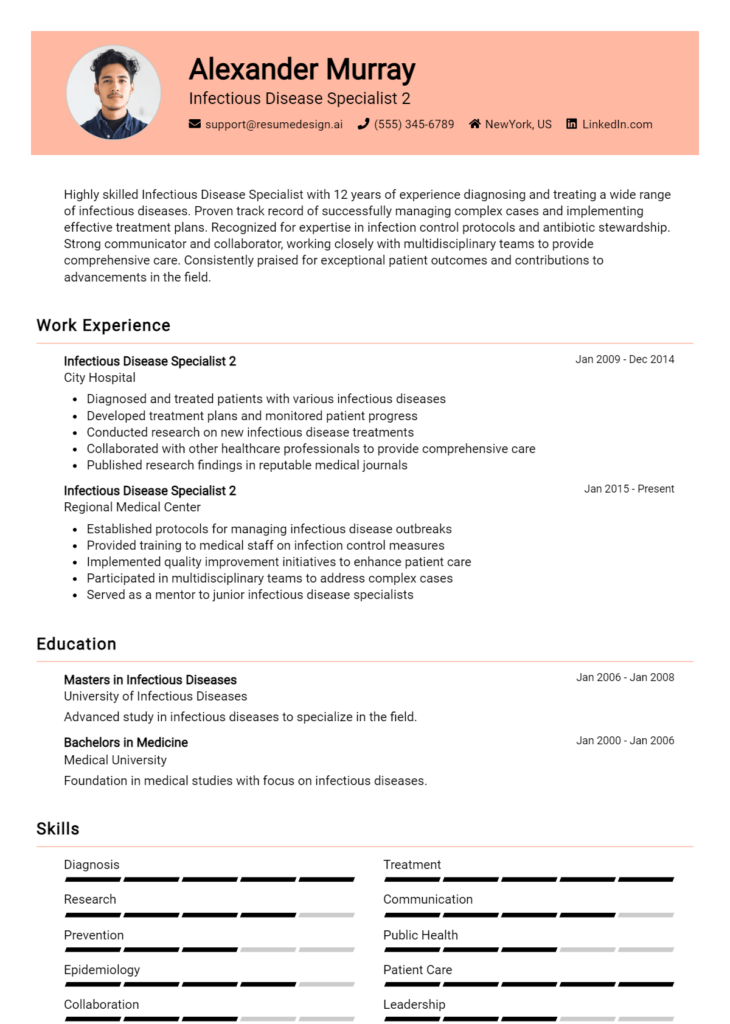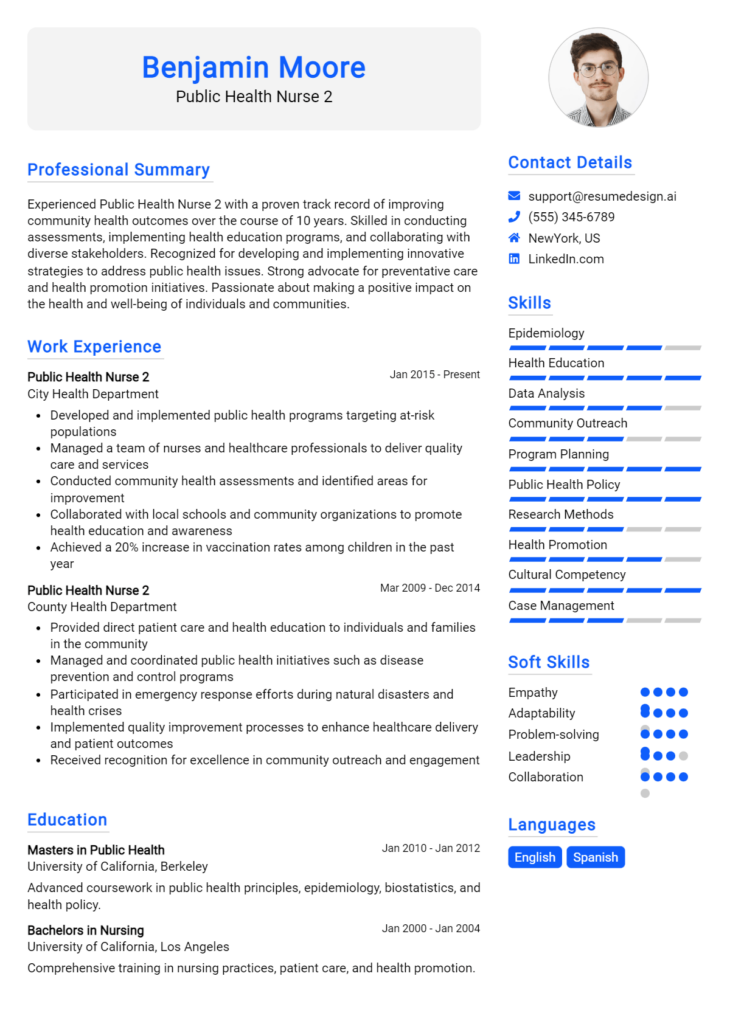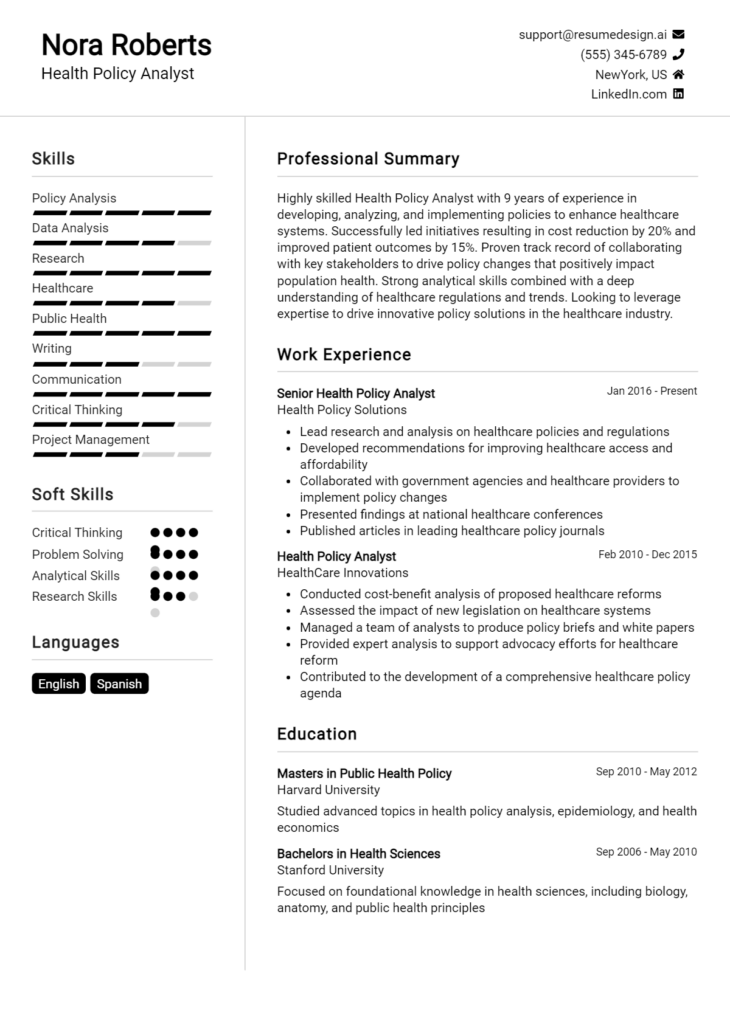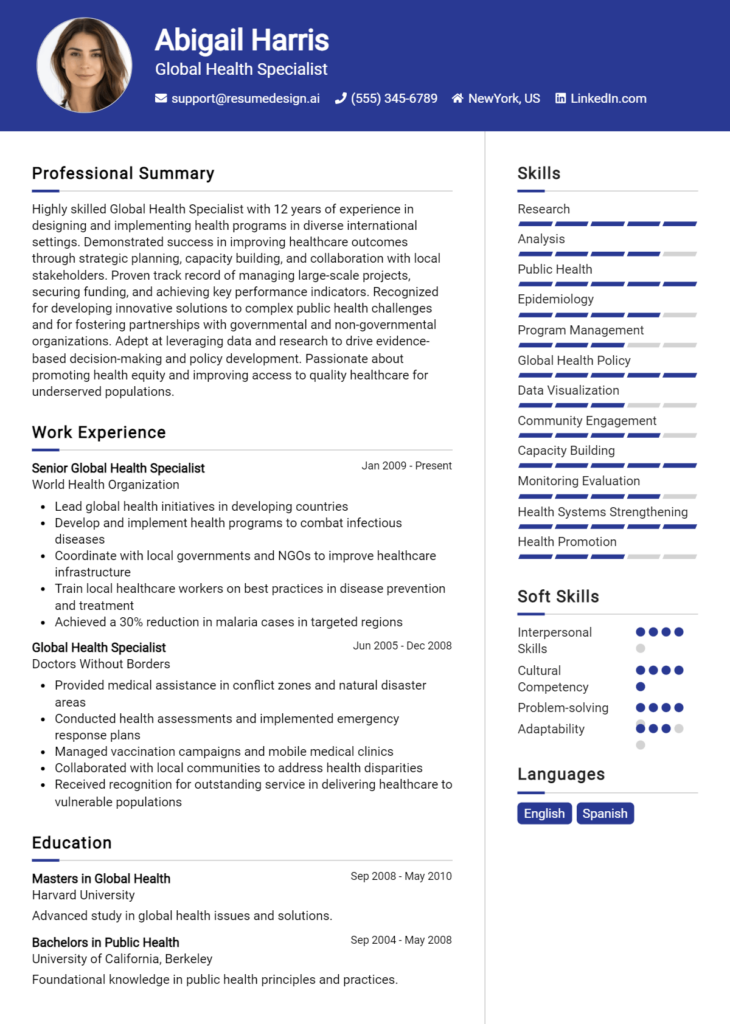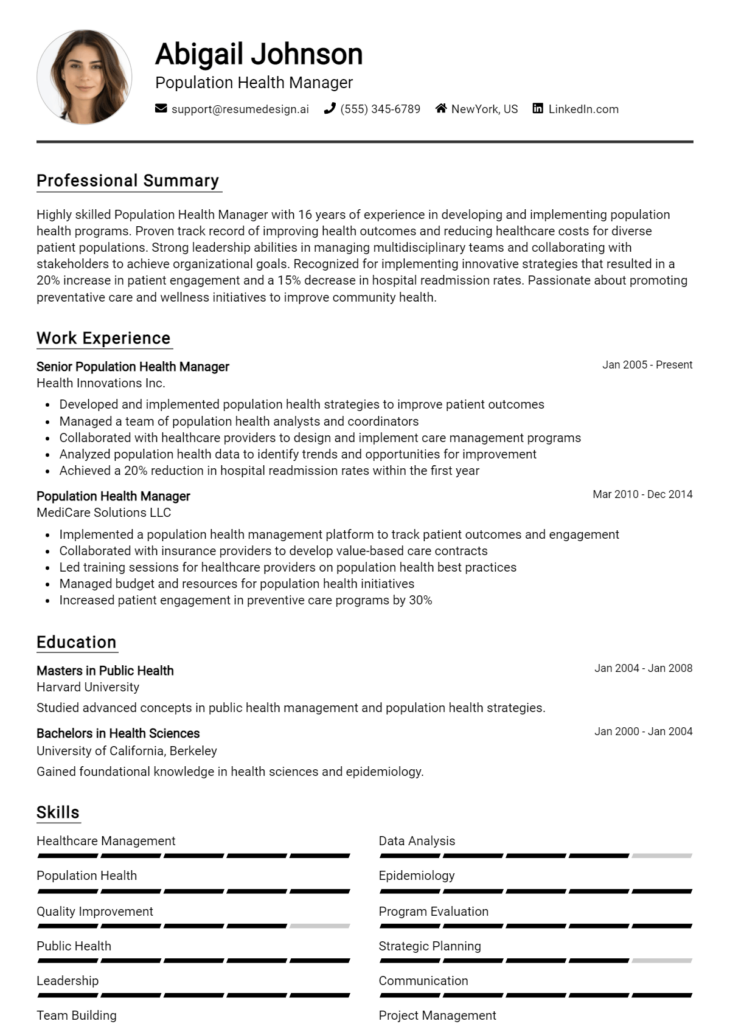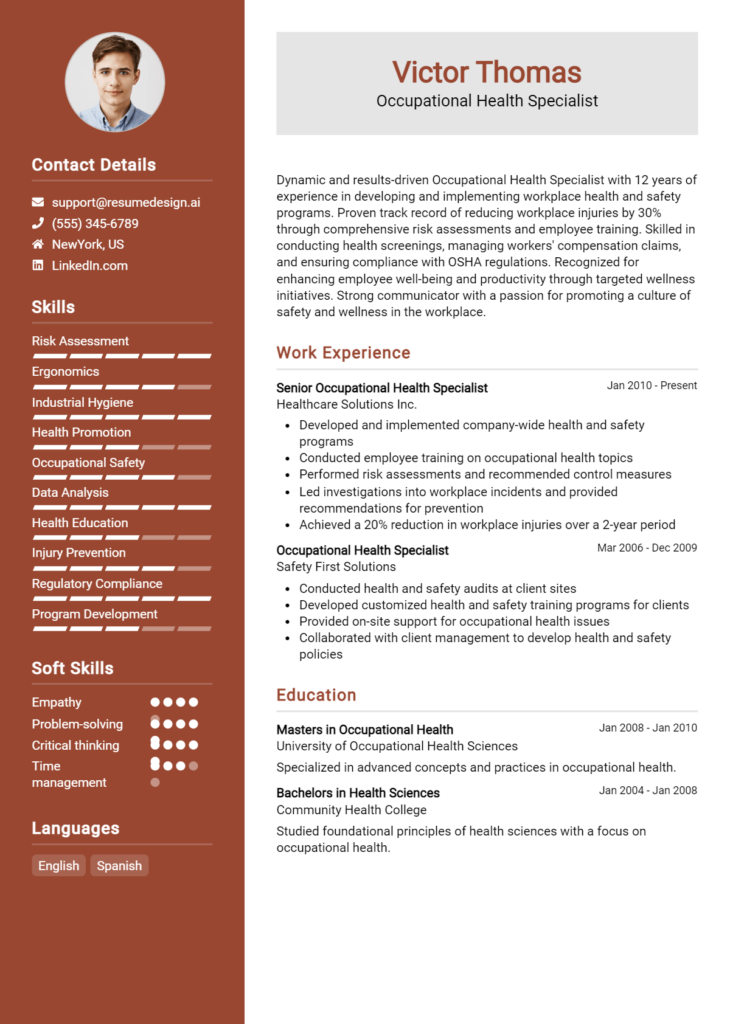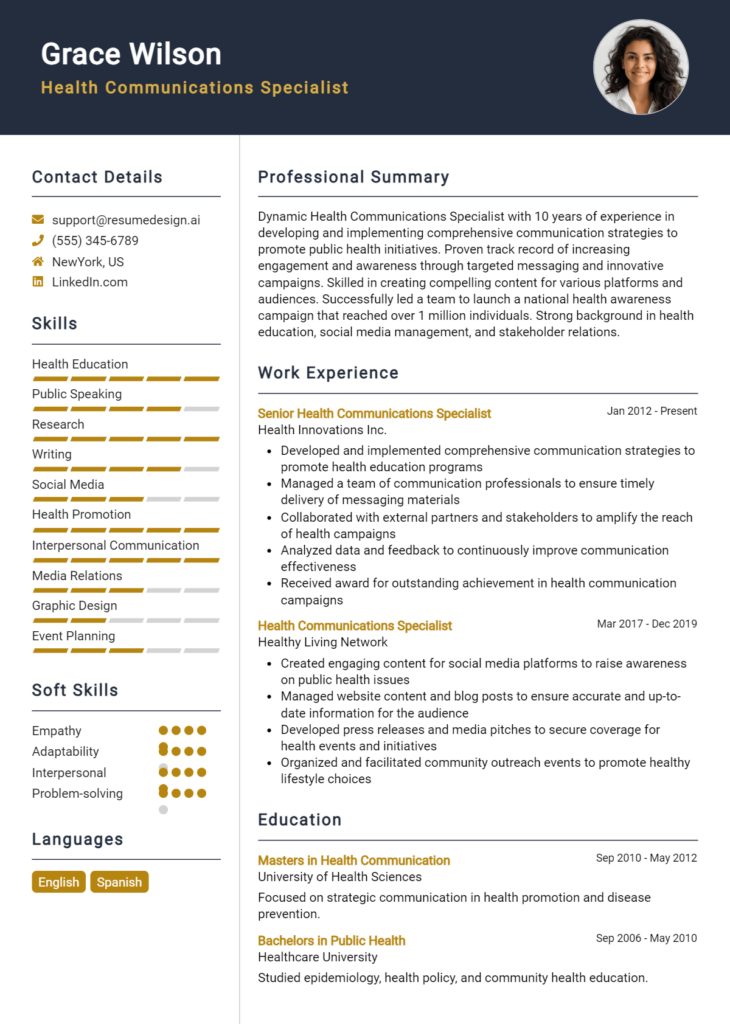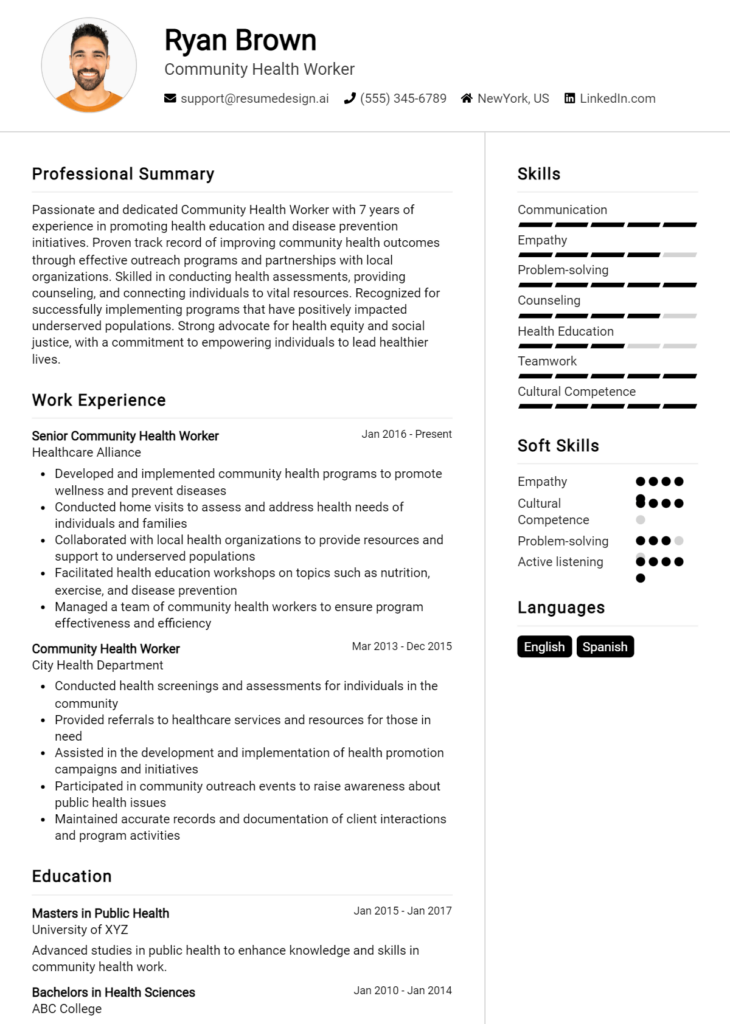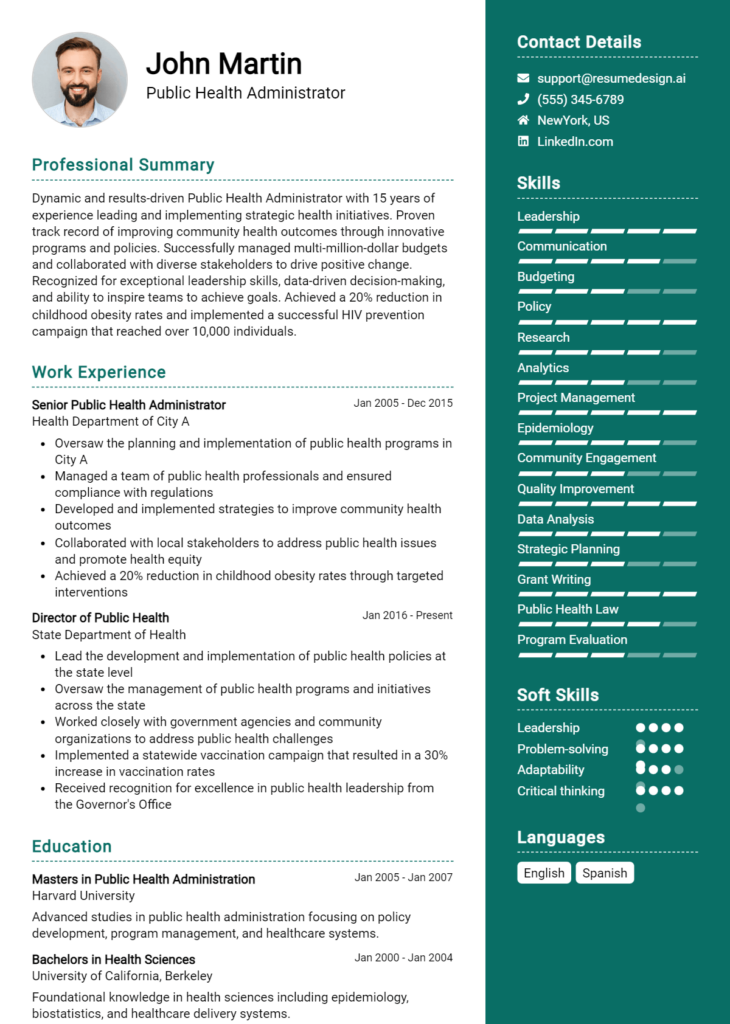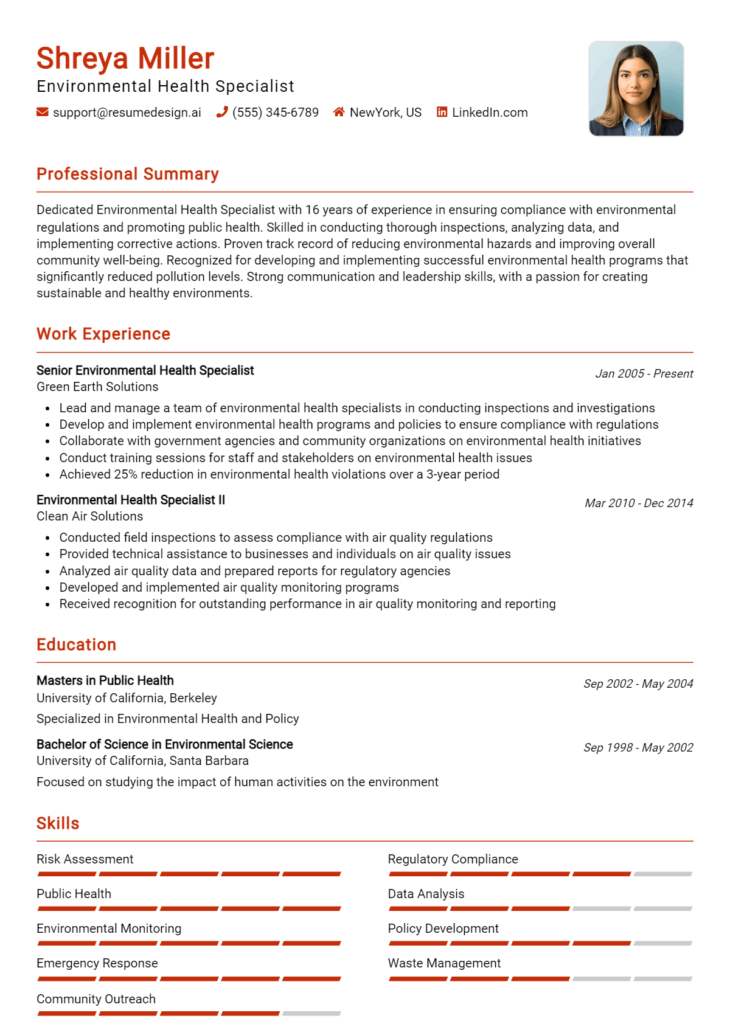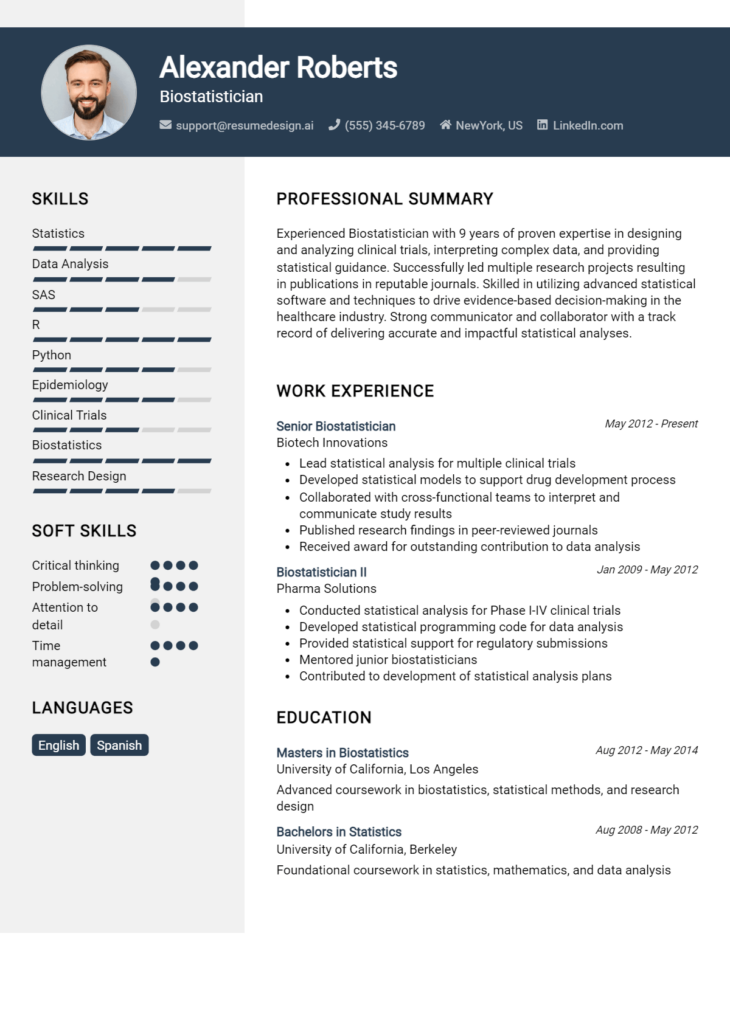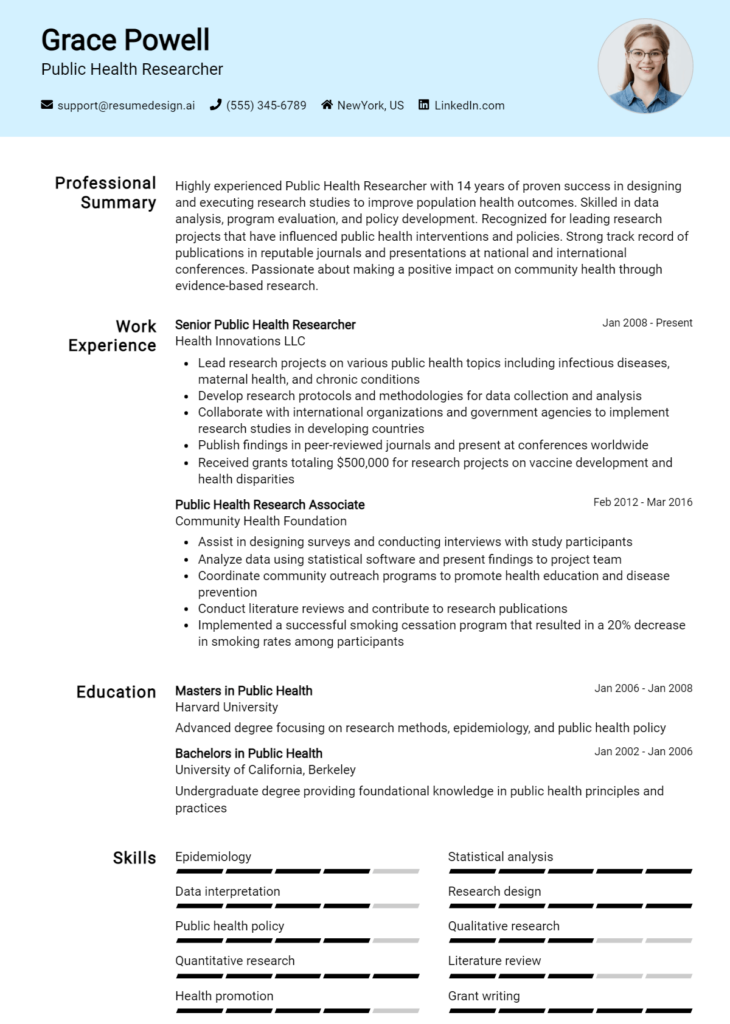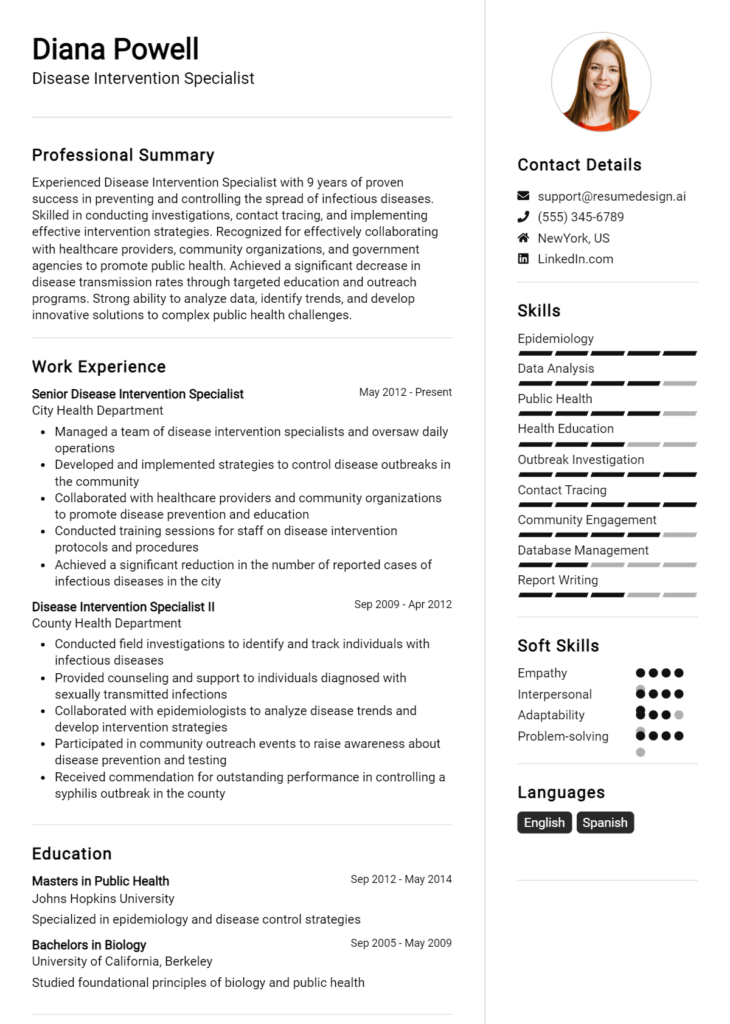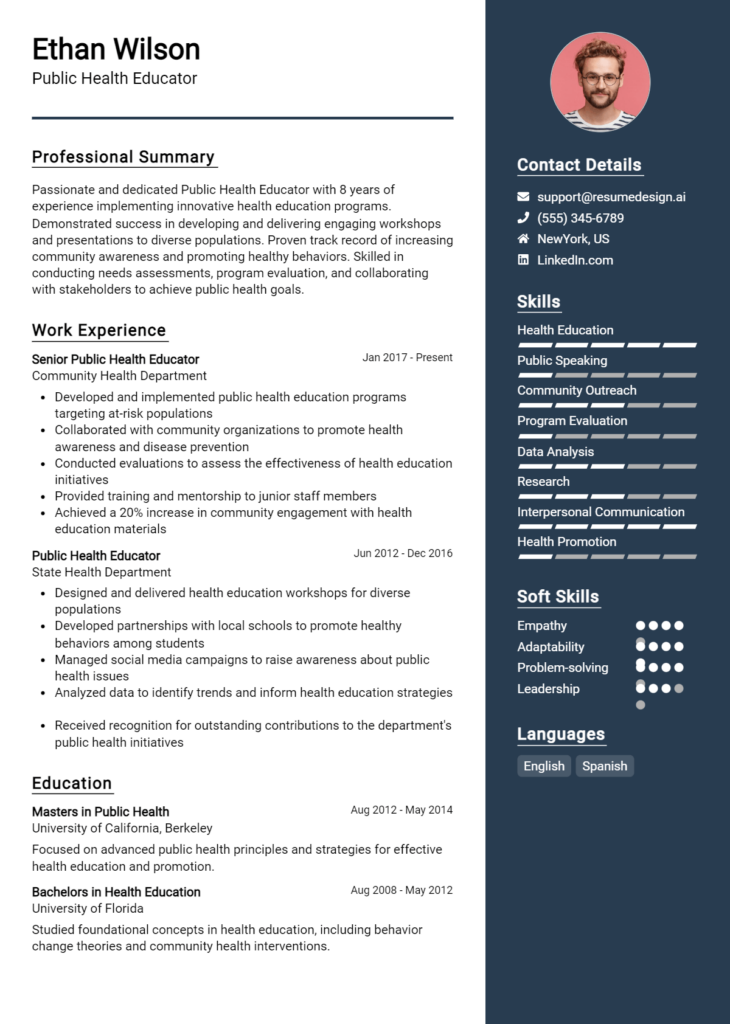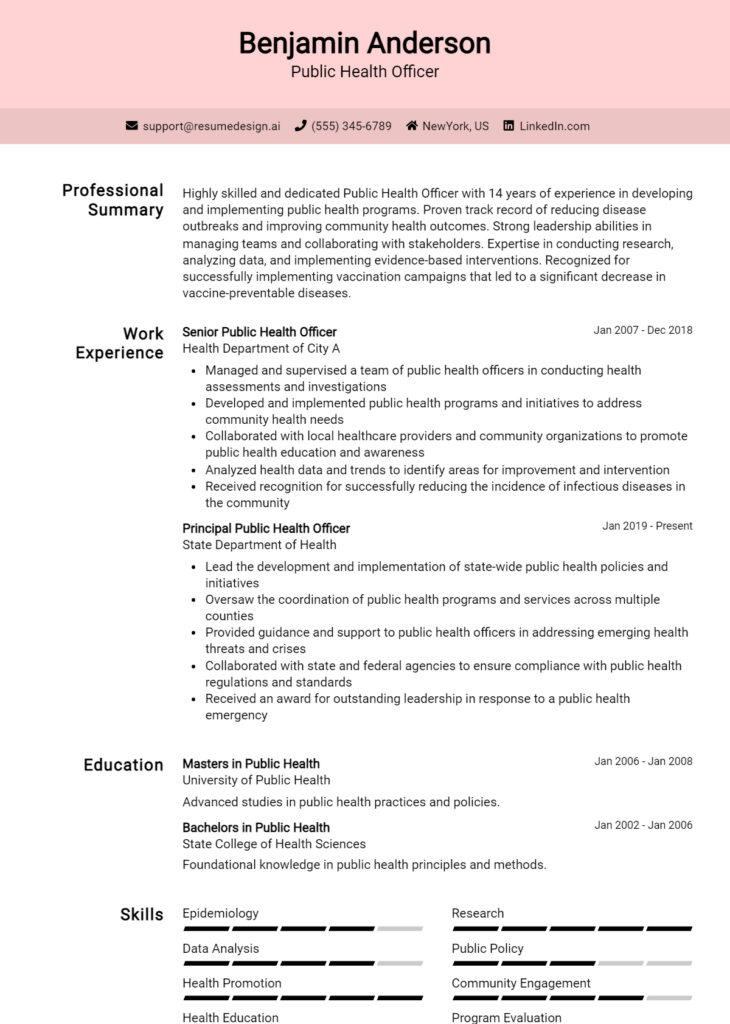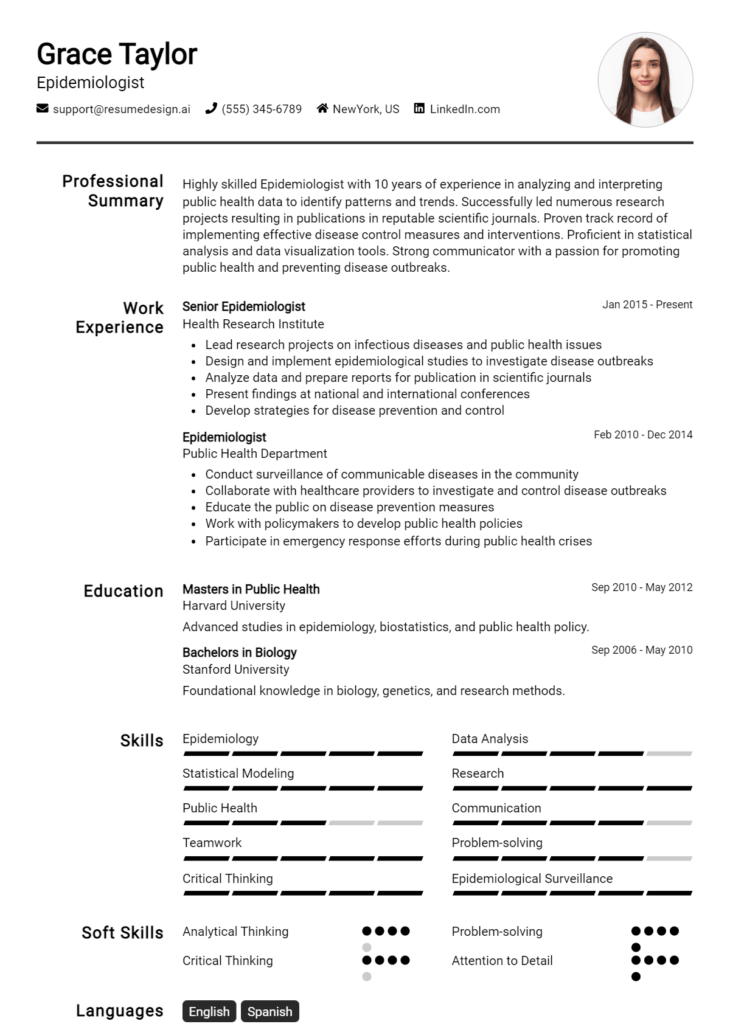Health Educator Core Responsibilities
A Health Educator plays a vital role in promoting wellness by developing and implementing educational programs that address community health issues. Key responsibilities include assessing community needs, designing health education materials, and collaborating with various departments like public health, nursing, and social services. Essential skills include strong communication, technical knowledge, operational efficiency, and problem-solving abilities. These competencies are crucial for achieving organizational goals, and a well-structured resume can effectively highlight these qualifications to potential employers.
Common Responsibilities Listed on Health Educator Resume
- Conduct health needs assessments to identify community health issues.
- Develop and implement health education programs and interventions.
- Collaborate with healthcare professionals and community organizations.
- Create educational materials and resources for diverse audiences.
- Facilitate workshops, seminars, and training sessions.
- Evaluate the effectiveness of health education initiatives.
- Advocate for health policy changes and community resources.
- Maintain accurate records and reports on health education activities.
- Stay updated on health trends and best practices in education.
- Provide one-on-one counseling and support to community members.
- Utilize technology for health education and outreach efforts.
High-Level Resume Tips for Health Educator Professionals
A well-crafted resume is essential for Health Educator professionals, as it serves as the first impression a candidate makes on potential employers. In a competitive job market, your resume must not only highlight your skills and qualifications but also effectively communicate your achievements and experiences in the field. A strong resume can set you apart from other applicants and showcase your dedication to promoting health and well-being in communities. In this guide, we will provide practical and actionable resume tips specifically tailored for Health Educator professionals to help you create a standout application.
Top Resume Tips for Health Educator Professionals
- Tailor your resume to each job description by using relevant keywords and phrases that align with the position.
- Showcase relevant experience in health education, community outreach, or public health initiatives to demonstrate your expertise.
- Quantify your achievements by including statistics or metrics that highlight the impact of your work.
- Highlight industry-specific skills, such as knowledge of health promotion theories, program development, and evaluation techniques.
- Include any certifications or credentials, such as Certified Health Education Specialist (CHES) or Master Certified Health Education Specialist (MCHES).
- Utilize a clean and professional format, ensuring your resume is easy to read with clear headings and bullet points.
- Incorporate volunteer work or internships related to health education to show your commitment to the field.
- Focus on your soft skills, such as communication, empathy, and leadership, which are crucial for effective health education.
- Keep your resume to one or two pages, ensuring that all information is relevant and concise.
By implementing these tips, you can significantly increase your chances of landing a job in the Health Educator field. A well-structured resume that effectively highlights your skills, experiences, and achievements will not only attract the attention of potential employers but also demonstrate your readiness to contribute to the health and well-being of the communities you serve.
Why Resume Headlines & Titles are Important for Health Educator
In the competitive field of health education, a well-crafted resume headline or title serves as a critical first impression for hiring managers. These concise phrases are essential for summarizing a candidate’s key qualifications and grabbing attention immediately. A strong headline not only highlights relevant skills and experiences but also conveys enthusiasm for the role, setting the tone for the rest of the resume. It should be directly related to the job being applied for, ensuring that it resonates with the specific expectations of the employer while remaining succinct and impactful.
Best Practices for Crafting Resume Headlines for Health Educator
- Keep it concise: Aim for one powerful sentence or phrase.
- Be role-specific: Tailor the headline to align with the job description.
- Highlight key qualifications: Focus on skills and experiences that make you stand out.
- Use impactful language: Choose action verbs and strong adjectives that convey confidence.
- Avoid jargon: Ensure clarity by using language understood by a broad audience.
- Reflect your unique value proposition: What sets you apart from other candidates?
- Make it compelling: Use persuasive language to draw the reader in.
- Stay relevant: Ensure the headline directly relates to health education and the specific role.
Example Resume Headlines for Health Educator
Strong Resume Headlines
Innovative Health Educator with 5+ Years of Experience in Community Engagement and Program Development
Certified Health Educator Specializing in Preventive Health Strategies and Wellness Initiatives
Dynamic Health Educator Committed to Promoting Healthy Lifestyles Through Evidence-Based Practices
Weak Resume Headlines
Health Educator Looking for a Job
Experienced Individual in the Health Field
Strong resume headlines are effective because they are direct, specific, and highlight the candidate’s unique skills and experiences, making a memorable impact on hiring managers. They serve not only as a summary but also as a hook that encourages further reading. In contrast, weak headlines fail to impress due to their vagueness and lack of specificity, which can leave hiring managers uninterested and unsure of the candidate's qualifications. By avoiding generic phrases, candidates can better position themselves in the competitive landscape of health education.
Writing an Exceptional Health Educator Resume Summary
A well-crafted resume summary is crucial for a Health Educator, as it serves as the first impression a candidate makes on hiring managers. This brief yet powerful section of a resume quickly captures attention and highlights essential skills, relevant experience, and notable accomplishments that align with the job requirements. An effective summary should be concise, impactful, and tailored to the specific position being applied for, ensuring that it resonates with potential employers and sets the candidate apart from the competition.
Best Practices for Writing a Health Educator Resume Summary
- Quantify achievements: Use numbers to demonstrate the impact of your work, such as the number of individuals educated or programs developed.
- Focus on relevant skills: Highlight key skills that are pertinent to the Health Educator role, such as communication, program development, and community engagement.
- Tailor the summary: Customize your summary for each job application by aligning your experiences with the specific job description.
- Keep it concise: Aim for 2-4 sentences that convey your qualifications without overwhelming the reader.
- Use action verbs: Start sentences with strong action verbs to convey confidence and proactivity.
- Highlight certifications: Mention relevant certifications or licenses that enhance your qualifications and credibility in the field.
- Showcase passion: Convey your commitment to health education and community health improvement to connect with your potential employer.
Example Health Educator Resume Summaries
Strong Resume Summaries
Dynamic Health Educator with over 5 years of experience designing and implementing community wellness programs that increased participation by 40%. Skilled in curriculum development and health promotion strategies, certified in Public Health Education.
Results-driven Health Educator with a proven track record of developing outreach initiatives that reached over 2,000 individuals, improving health literacy by 30%. Expertise in collaborating with community organizations to address public health challenges.
Compassionate Health Educator with a Master’s degree in Public Health and extensive experience in patient education. Successfully coordinated a diabetes prevention program that led to a 25% reduction in high-risk participants within one year.
Weak Resume Summaries
Health Educator with some experience in community health. Looking for a position to further my career.
Dedicated professional eager to help people understand health issues. Interested in working with organizations to create health programs.
The strong resume summaries stand out because they effectively quantify achievements, specify relevant skills, and directly relate to the responsibilities of a Health Educator. In contrast, the weak summaries lack detail and clarity, failing to provide measurable outcomes or demonstrate how the candidate's experience aligns with the job role, making them less compelling to hiring managers.
Work Experience Section for Health Educator Resume
The work experience section of a Health Educator resume is critical as it serves as a testament to the candidate's expertise and effectiveness in the field. This section not only highlights the technical skills essential for health education but also showcases the ability to manage teams and deliver high-quality educational programs. Employers look for quantifiable achievements that demonstrate the candidate's impact, and aligning experiences with industry standards is crucial for standing out in a competitive job market.
Best Practices for Health Educator Work Experience
- Focus on relevant health education roles that demonstrate your expertise.
- Quantify achievements with specific metrics (e.g., percentage improvements, number of participants reached).
- Highlight any leadership roles that involved managing teams or projects.
- Include technical skills that are relevant to health education, such as curriculum development or data analysis.
- Use action verbs to convey your contributions and responsibilities clearly.
- Align your experiences with industry standards and best practices in health education.
- Emphasize collaboration with other health professionals or community organizations.
- Tailor your experiences to match the job description and desired qualifications of the role you're applying for.
Example Work Experiences for Health Educator
Strong Experiences
- Developed and implemented a community health program that increased participant engagement by 40% within six months.
- Led a team of five health educators in delivering workshops that educated over 1,000 individuals about chronic disease prevention.
- Conducted a comprehensive needs assessment that informed a new curriculum, resulting in a 25% improvement in participant knowledge scores.
- Collaborated with local hospitals and organizations to launch a health fair that provided free screenings to over 300 community members.
Weak Experiences
- Assisted in health education activities.
- Participated in team meetings related to health programs.
- Helped organize events for health awareness.
- Worked on various health-related tasks as assigned.
The examples of strong experiences demonstrate clear, quantifiable outcomes and showcase leadership and collaboration, which are essential qualities for a Health Educator. In contrast, the weak experiences lack specificity and measurable impact, making them less compelling to potential employers. Strong experiences provide a clear picture of the candidate's contributions and effectiveness, while weak experiences fail to highlight significant achievements or skills.
Education and Certifications Section for Health Educator Resume
The education and certifications section of a Health Educator resume is crucial as it showcases the candidate's academic background, industry-relevant certifications, and ongoing commitment to professional development. This section not only reflects the candidate's formal training but also emphasizes their dedication to continuous learning in the ever-evolving field of health education. By including relevant coursework, specialized training, and recognized certifications, candidates can significantly enhance their credibility and demonstrate alignment with the specific requirements of the job role, making a strong case for their qualifications in the eyes of potential employers.
Best Practices for Health Educator Education and Certifications
- Focus on relevant degrees, such as Health Education, Public Health, or a related field.
- Include current and recognized certifications, like Certified Health Education Specialist (CHES) or Certified in Public Health (CPH).
- Highlight any specialized training or workshops that pertain to health education topics.
- List coursework that directly relates to the responsibilities of a Health Educator, such as health promotion, program planning, and evaluation.
- Emphasize advanced degrees (e.g., Master’s or Doctorate) to stand out in a competitive job market.
- Maintain clarity and organization to ensure that the information is easy to read and digest.
- Use a chronological format to present education and certifications, starting with the most recent first.
- Consider including relevant volunteer experiences or internships that enhance professional credibility.
Example Education and Certifications for Health Educator
Strong Examples
- M.S. in Health Education, University of Public Health, 2022
- Certified Health Education Specialist (CHES), National Commission for Health Education Credentialing, 2023
- Certificate in Community Health Promotion, Health Promotion Institute, 2021
- Relevant Coursework: Program Planning and Evaluation, Health Behavior Theory, Nutrition and Health Education
Weak Examples
- B.A. in History, University of Arts, 2010
- First Aid Certification (Expired, 2020)
- Online Course in Cooking Basics, 2021
- High School Diploma, 2005
The examples provided illustrate the distinction between strong and weak qualifications for a Health Educator. Strong examples include relevant degrees and certifications that directly align with the role, showcasing the candidate's preparedness and expertise. In contrast, weak examples feature irrelevant educational backgrounds or outdated certifications that do not contribute to the candidate's qualifications for health education positions, thereby diminishing their appeal to potential employers.
Top Skills & Keywords for Health Educator Resume
As a Health Educator, possessing the right skills is crucial for effectively promoting health and wellness within communities. A well-crafted resume that highlights both hard and soft skills can significantly enhance a candidate's prospects in this competitive field. Skills not only demonstrate a candidate's qualifications but also reflect their ability to communicate, engage, and empower individuals to make informed health choices. By tailoring your resume to showcase these essential competencies, you can create a compelling narrative that resonates with potential employers. For more insights on how to enhance your resume, check out our resources on skills and work experience.
Top Hard & Soft Skills for Health Educator
Soft Skills
- Excellent communication skills
- Empathy and active listening
- Cultural competence
- Public speaking and presentation skills
- Teamwork and collaboration
- Problem-solving abilities
- Adaptability and flexibility
- Motivational interviewing
- Conflict resolution
- Strong organizational skills
- Critical thinking
- Relationship-building
- Time management
- Leadership qualities
- Community engagement
Hard Skills
- Knowledge of health promotion theories
- Program planning and implementation
- Health assessment techniques
- Data analysis and interpretation
- Familiarity with health education materials and resources
- Proficiency in Microsoft Office Suite
- Understanding of public health policies
- Experience with grant writing and funding proposals
- Ability to develop educational curricula
- Knowledge of behavioral change strategies
- Familiarity with health informatics and technology
- Research skills
- Evaluation and assessment strategies
- Knowledge of disease prevention and control
- Statistical software proficiency
- Event planning and coordination
- Social media management for health communication
Stand Out with a Winning Health Educator Cover Letter
As a dedicated health educator with over five years of experience in developing and implementing health programs, I am excited to apply for the Health Educator position at [Company Name]. My background in public health, combined with my passion for empowering individuals through education, positions me well to contribute to your team. I have successfully designed and delivered workshops on nutrition, disease prevention, and wellness, which have resulted in increased community engagement and improved health outcomes.
In my previous role at [Previous Company Name], I collaborated with local organizations to create tailored health education materials that addressed the unique needs of diverse populations. By utilizing data-driven approaches and conducting needs assessments, I was able to identify gaps in knowledge and resources, allowing me to develop effective educational strategies. My ability to communicate complex health information in a clear and relatable manner has enabled me to foster trust and build lasting relationships with community members.
I am particularly drawn to [Company Name] because of your commitment to promoting health equity and improving access to resources for underserved populations. I admire your innovative programs that focus on preventive health measures and lifestyle changes. I am eager to bring my experience in program evaluation and stakeholder engagement to further enhance your initiatives and drive positive change in the community.
Thank you for considering my application. I look forward to the opportunity to discuss how my skills and experiences align with the goals of [Company Name]. I am excited about the possibility of contributing to your mission of improving health literacy and empowering individuals to take charge of their health.
Common Mistakes to Avoid in a Health Educator Resume
When crafting a resume for a Health Educator position, it’s essential to present your qualifications and experience effectively. A well-structured resume can significantly enhance your chances of securing an interview, while common mistakes can undermine your efforts. Here are some frequent pitfalls to avoid when preparing your Health Educator resume:
Neglecting Tailoring: Failing to customize your resume for each job application can make it seem generic. Highlight relevant skills and experiences that align specifically with the job description.
Overloading with Jargon: Using excessive technical language or jargon can alienate those reviewing your resume. Aim for clarity and accessibility, ensuring your message resonates with a broader audience.
Omitting Quantifiable Achievements: Not including measurable outcomes or accomplishments can make your contributions seem vague. Use numbers and statistics to demonstrate your impact, such as the percentage of improved health outcomes in your programs.
Using an Unprofessional Email Address: An unprofessional email can give a poor first impression. Always use a simple, professional email address that includes your name.
Ignoring Formatting Consistency: Inconsistent formatting can distract from your qualifications. Ensure uniformity in font, size, and style throughout your resume for a polished appearance.
Excessive Length: A resume that is too lengthy can lose the reader's attention. Aim to keep your resume concise, ideally one page, focusing on the most relevant experiences and skills.
Failing to Showcase Soft Skills: Health educators require strong interpersonal skills. Neglecting to highlight qualities like communication, empathy, and teamwork can diminish your appeal as a candidate.
Not Including Continuing Education: In the rapidly evolving field of health education, failing to mention ongoing training or certifications can suggest a lack of commitment to professional growth. Always include relevant courses or workshops that enhance your qualifications.
Conclusion
As a Health Educator, your role is vital in promoting health awareness and disease prevention within communities. Throughout this article, we explored the importance of effective communication skills, the ability to assess community health needs, and the necessity of staying updated with the latest health information and trends. Additionally, we discussed the significance of collaboration with healthcare professionals and organizations to create impactful health education programs.
Now that you understand the skills and experiences that are essential for a successful Health Educator, it's time to reflect on your own qualifications and experiences. Is your resume effectively showcasing your strengths?
We encourage you to review and update your Health Educator resume to ensure it highlights your relevant skills and experiences. To assist you in this process, consider utilizing the following resources:
- Browse through resume templates to find a design that suits your style.
- Use the resume builder to create a polished and professional resume quickly and easily.
- Check out resume examples for inspiration and to see how others in your field present their qualifications.
- Don't forget to craft a compelling cover letter using our cover letter templates to complement your resume.
Take action today and ensure your resume stands out in the competitive field of health education!

